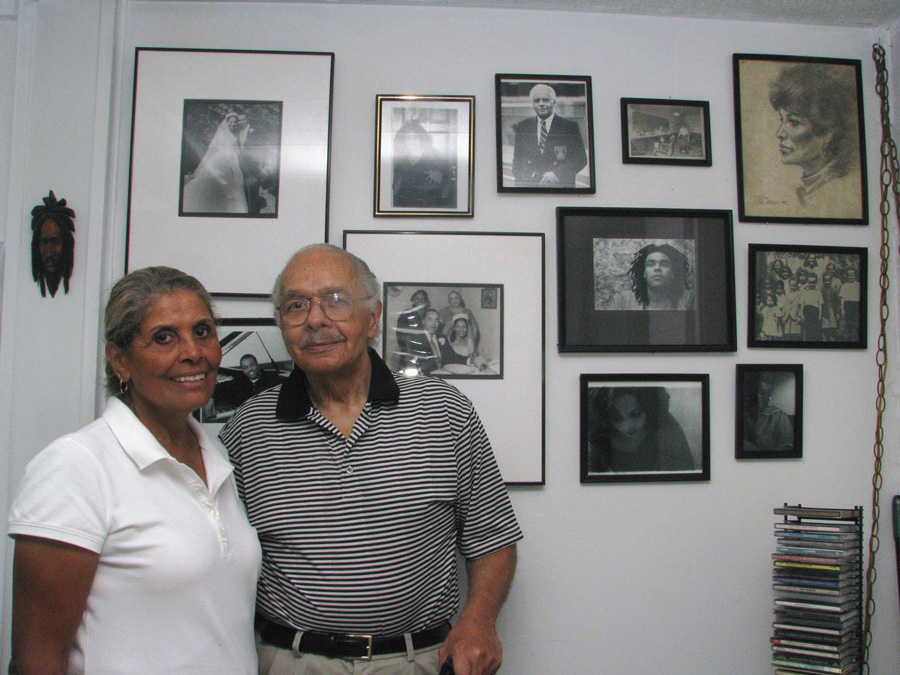When one thinks of veterans, they think about those individuals in combat on the frontlines, but often forget about those behind the scenes. For three years Stanley Rideout, retired chief of police for the Pittsburgh Public School District, worked behind the scenes for one of the world’s most deadly conflicts, World War II, before working in front of them keeping order.
| FAMILY MAN—Veteran Stanley Rideout with his wife, Vina, in front of their wall of family portraits. |
It was his senior year at South Hills High School, when Rideout, 85, now of Sewickley, learned he was going to be drafted into the armed forces. “I did not want to go. I requested deference, but was denied,” he said.
So after his graduation from high school, the then- Beltzhoover resident, entered the U.S. Navy in September of 1943, and was stationed in the Great Lakes area, where he went to school to be a radioman in the service. Radiomen specialized in communication and were responsible for decoding messages and getting them to their commanding officer or the appropriate chain of command.
Rideout was then transferred to a station 40 miles north of Seattle and from there was ordered to Hawaii and stationed at Midway Island; the day after the atomic bomb was dropped in Japan.
“Midway was the only time that I was in real danger. I was never really in combat,” said Rideout. “But it was hard for my mom. (I) and four of my brothers were in the service at the same time. We all served this country.
Although the Navy was integrated at that time, he said things were still bad.
“The average Black sailor was a ‘Yes Boy,’” Rideout said. “We did whatever we were told.” He recalls a time when he was stationed in Seattle and a White lieutenant called him and three other Black radiomen to his office.
“He called us in and let us know how he felt. He said he felt that all Black sailors should be in the mess department but the service did not agree with him. After he let us know how he felt, he never gave us any trouble,” Rideout said.
President Harry Truman signed the bill desegregating the rest of the military in 1948.
It was while he was stationed in Washington state that the G.I. Bill was signed, granting college or vocational education for World War II veterans. And education had been something always important to Rideout.
“I always wanted to go to college. Ever since I was 9 or 10-years-old I was always determined to go and never lost that dream,” he said. Even while some individuals tried to discourage him. So after he returned home from the war in 1946 he was determined to go to college.
“I had a few odd jobs,” he said. For instance he worked at 52/20 club for Black veterans, which paid them $20 for 52 weeks. While working he applied to Duquesne University and was accepted and from 1950-1954 attended, majoring in Journalism with a minor in Political Science. “I was the only Black in my class and had a difficult time getting a job. “
After he graduated he continued to do odd jobs and became a probation officer for a juvenile court.
It was during the assassination of Dr. Martin Luther King Jr., that he really found what he wanted to do. “A principal at Knoxville school had asked me to come and help to keep things in order, so I volunteered.”
Shortly after he became the Chief of School Police for the Pittsburgh Public Schools where he stayed and retired from after 26 years.
“I feel I was successful at my job. I won the respect of many. It was the happiest job I’ve ever had. “
Rideout is also known for the 45 years he spent as the Executive Director of the Sewickley Community Center.
But he says,” one of his proudest moments is when I established the Sewickley Come on Home Weekend in 1966.” The Come on Home weekend is an annual event that consisted of many activities to get people to come back to Sewickley for one weekend a year. “It ran for 43 years.”
Now Rideout is enjoying the time with his wife of 53 years Vina, a retired nurse, and his four children, two girls and two boys.
Rideout said that although he is patriotic and supports the United States, he disagrees with the wars in Iraq and Afghanistan. “I think it was mishandled and now we’re costing taxpayers trillions of dollars.” He also disagrees with the treatment of veterans in this country, especially Vietnam veterans. “I think they felt lost because they did not get the hero’s welcome, like others did. We could never repay them for what they gave,” He said. “No matter how you served or where you served, you are still a veteran.”
